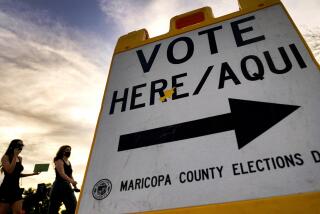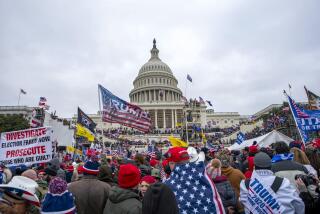Supreme Court justices sharply divided in Voting Rights Act case
- Share via
WASHINGTON — The Supreme Court justices divided sharply along ideological lines Wednesday as they debated whether racial discrimination in voting remains a serious problem in the South, with conservative justices pushing toward striking down a key part of the Voting Rights Act of 1965.
Justice Antonin Scalia called the law “a perpetuation of a racial entitlement…. This is not the kind of question you can leave to Congress.”
He was responding to U.S. Solicitor General Donald Verrilli Jr., who noted that the Senate voted unanimously in 2006 to extend the Voting Rights Act.
But Scalia and his conservative colleagues showed hostility to one of the nation’s landmark civil rights measures. Even if the law once was badly needed, they insisted Congress did not have the evidence to justify continuing a measure that requires officials in nine states, mostly in the South, to seek advance clearance from Washington before they make changes in their election laws.
Chief Justice John G. Roberts Jr. pointed to data showing that blacks register and vote at a higher rate in Mississippi compared with Massachusetts.
Justice Anthony M. Kennedy, whose vote may be decisive, said the states deserved to be treated equally and that Congress did not have reason to continue a law that puts the South under a special scrutiny.
Throughout the hour, the four liberal justices were just as vehement in defending the law.
If any state deserves to be closely watched for racial discrimination, it’s Alabama, said Justice Sonia Sotomayor. “Maybe you are the wrong party to bring this case,” she told a lawyer for Shelby County, Ala.
Justice Stephen G. Breyer called racial discrimination in voting “an old disease” that is still not fully cured. Congress looked into the issue and decided “the problem is still there to some degree,” he said.
Four years ago, Justice Clarence Thomas voted alone to strike down the Voting Rights Act. While he did not ask questions Wednesday, he is certain to join with the four other conservative justices if they vote to strike down Section 5 of the Voting Rights Act.
ALSO:
Supreme Court throws out challenge to U.S. wiretapping
Prosecutors highlight identity theft at ‘Craigslist Killer’ trial
Students anxious after college sophomore killed near dorm
More to Read
Sign up for Essential California
The most important California stories and recommendations in your inbox every morning.
You may occasionally receive promotional content from the Los Angeles Times.












